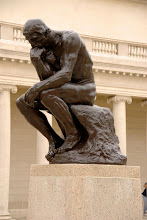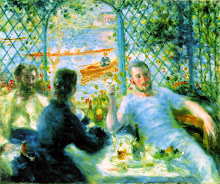One of my favorite television series from earlier days was the swashbuckling Napoleonic period piece, Horatio Hornblower. The series won some awards and was vastly entertaining, primarily because of its winning title character. "Winning" is an appropriate term for Hornblower as he is depicted in the films; that is, he is an endearingly high minded fellow and also a highly successful seaman-soldier. His commanding officer, Admiral Pellew, played pragmatically by Robert Lindsay, supplies the obligatory praise and promotion at the end of each episode. I call it obligatory because the audience couldn't do without it. Horatio's courage is the kind that must be praised, just as The Underdog Small Town Football Team must defeat the Black Suited Foes and win the MacGuffin. Otherwise, we, the audience, will not enjoy it. As with any series, each episode must be grander than the last, and Pellew's praise and reward must rise correspondingly. This, of course, leads to a degree of silliness:
Episode 1:
Pellew: Hornblower that was damn fine work. Keep this up and you will be a lieutenant in no time.
Hornblower: (Dignified) Thank you, sir.
Episode 2:
Pellew: By God, Hornblower! I've never seen anyone attempt what you have just attempted, sir! That was courage indeed!
Hornblower: (Honorably) Thank you, sir.
Episode 3:
Pellew: Hornblower that was incredible! You must have nerves of steel underneath that handsome face! You are the finest seaman I have had the pleasure to encounter, sir!
Hornblower: (Meaningfully) Thank you, sir.
Episode 4:
Pellew: Hornblower! You rascal! You're like a son to me! By Jove, you are Poseidon himself! I bend the knee before you! You are like a god among men, sir!
Hornblower: (Nobly) Thank you, sir.
After seeing Horatio Hornblower, I sought out the books by C.S. Forester. I was shocked to discover the farther I read that the Hornblower of the films and the Hornblower of the novels are entirely different individuals. The former is high minded, patriotic, idealistic, brave. The latter is selfish, conceited, reserved, clever, and desperate (which is a different quality than courage, though it may lead to a similar outcome).
In short, I detest Horatio Hornblower. He is a womanizing prig who is continually successful in his enterprises and conquests. He is James Bond with baggage, a terrible concoction. Indeed, I hate the Horatio Hornblower of the novels so much that he has led me to attempt a philosophical distinction that may or may not hold water, but which will certainly be a flag I will fly proudly.
The distinction concerns the idea of the Anti-Hero. I don't generally like anti-heros, at least not the kind who are to be found in bars with sympathetic women. There are those who are quite likeable, even admirable. Sydney Carton, Edmund Dantes, Captain Blood, Bruce Wayne; these names are just a few that come to mind. All have something in common: honor. Their honor may be questionable; in other words, it may be the kind that society would be inclined to reject. But their honor is certainly something they cherish. They act according to honor and seek honorable actions. They may have it or not, but they certainly hold it to be something worth having.
Hornblower, on the other hand, represents a kind of Anti-Hero that puts no stock in honor. He puts stock in Stock. Worldly considerations like money, women, prestige, freedom from obligation and the like, are the life blood of this Archetype. Instead of Honor, the Bogart (as I call him) believes in getting his and villains getting theirs. This may masquerade as Honor, but in fact it is something totally different and altogether unwholesome.
The essence of Honor is Selflessness. The essence of the Bogart is Selfishness. The two are mutually opposed. Exactly where the Bogart emerged is a mystery. My own dim guess would be in the pages of Greek legend. Regardless, he has play acted the part of the Hero for one too many decades. He would have never been countenanced in earlier centuries. The fact that we do so now is an unfortunate commentary on our moral fiber.
Of course, most people haven't read the Hornblower books. They saw the films which feature a character about as far from the Bogart as could possibly be imagined. We might call him the Stewart.
Monday, September 28, 2009
Subscribe to:
Post Comments (Atom)










No comments:
Post a Comment